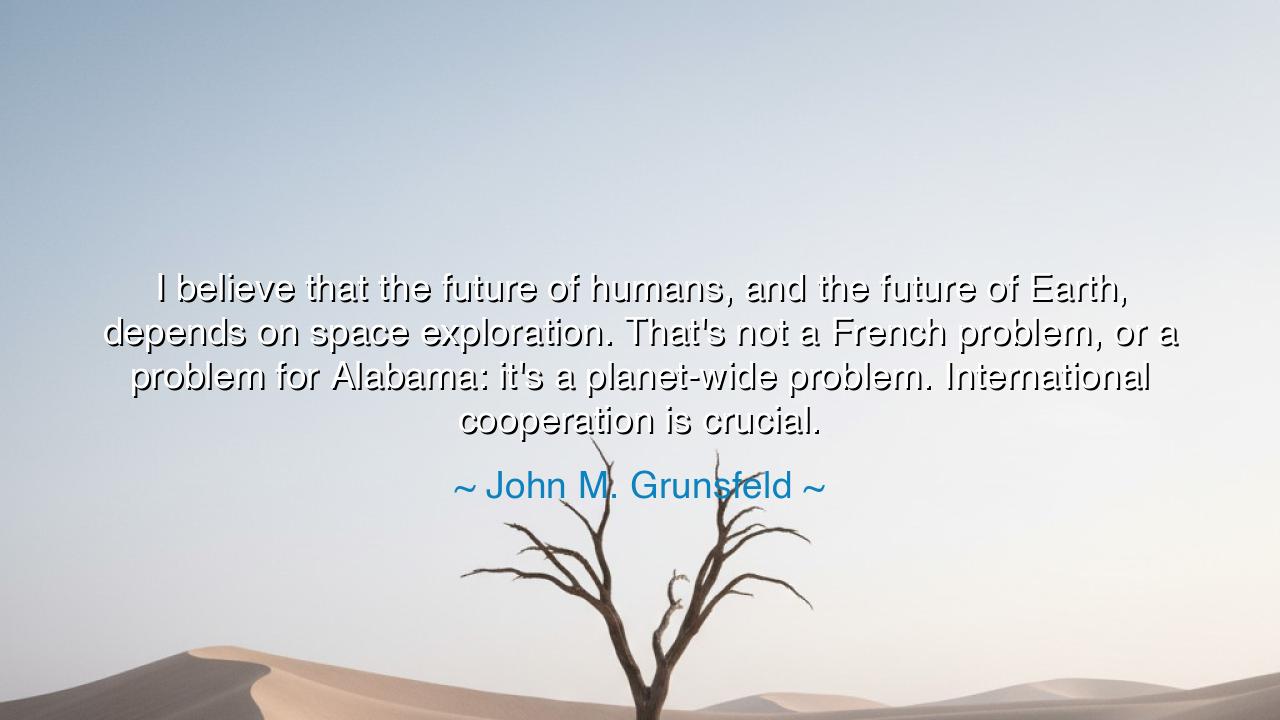
I believe that the future of humans, and the future of Earth
I believe that the future of humans, and the future of Earth, depends on space exploration. That's not a French problem, or a problem for Alabama: it's a planet-wide problem. International cooperation is crucial.






"I believe that the future of humans, and the future of Earth, depends on space exploration. That's not a French problem, or a problem for Alabama: it's a planet-wide problem. International cooperation is crucial." These words spoken by John M. Grunsfeld echo a timeless truth that has resonated through the annals of human history: the future of our species is intertwined with our capacity to work together and look beyond the limits of our current world. Grunsfeld’s statement highlights the importance of global unity in addressing challenges that are too large, too complex, and too interconnected for any single nation or region to solve alone. Just as the ancient peoples came together to share knowledge, resources, and wisdom for the benefit of all, so too must we join forces to face the monumental challenges that space exploration presents, ensuring the survival and prosperity of our planet.
In the ancient world, there were many instances where cooperation among various tribes and peoples was key to achieving greatness. Consider the story of Alexander the Great, who, though he was the leader of a Greek army, sought to unite a vast empire stretching from Greece to India. His vision was not just one of conquest, but of unity among different cultures, peoples, and regions. He believed that the world could be brought together under a single banner—not through force alone, but by respecting and learning from those he conquered. This idea of international cooperation was echoed by the Romans, who, through their Pax Romana, established a unified empire where different cultures, religions, and practices coexisted, fostering an exchange of ideas and innovations. Grunsfeld’s call for international cooperation in space exploration mirrors this ancient wisdom, reminding us that great accomplishments come not from isolation, but from working together across boundaries.
Grunsfeld's quote speaks to the urgent need for a collective vision—one that transcends the confines of individual nations. The challenges facing Earth—from climate change to resource depletion—are global issues that cannot be solved by any one country. Just as ancient philosophers like Plato and Aristotle recognized the interconnectedness of humanity and the world around them, so too must we acknowledge that the survival of our planet depends on our ability to work together. Plato in The Republic imagined a society where people acted for the common good, not just their own individual gain. In a similar vein, Grunsfeld emphasizes the need for international cooperation as a cornerstone of space exploration, a shared endeavor that will benefit not just individual countries but humanity as a whole.
In the modern age, the space race of the mid-20th century exemplifies the necessity of cooperation in facing challenges too large for any single nation. During the Cold War, the United States and the Soviet Union were locked in fierce competition, yet their rivalry led to some of the greatest achievements in human history—such as the moon landing in 1969. The Apollo-Soyuz mission in 1972, a joint space venture between the U.S. and the Soviet Union, marked a significant moment of international cooperation during a time of global tension. This historic mission demonstrated that even in the most divided times, humanity could come together to achieve something that benefited all. Grunsfeld’s quote calls for a similar commitment to collaboration, recognizing that the future of space exploration—and by extension, the future of Earth—requires a global effort that transcends borders and national interests.
The lesson Grunsfeld offers is a universal truth: that cooperation is not just a moral ideal but a practical necessity for the advancement of humanity. Whether in space, in environmental conservation, or in global health, the challenges we face are too great for any nation to solve alone. The future of our planet depends on our ability to come together, share resources, and work as one. Just as Alexander, Plato, and the Romans saw the importance of unity in their times, we too must realize that only by standing together, pooling our knowledge and capabilities, can we hope to overcome the obstacles that threaten our world.
In our own lives, this message is one of shared responsibility. We are all part of a global community, and the choices we make today have consequences that stretch far beyond our own borders. Whether we are working on the front lines of climate change, pursuing scientific innovation, or simply living as conscientious citizens, we must remember that our actions have the potential to either unite or divide us. Grunsfeld's call to cooperate for the common good is a reminder that the greatest challenges of our time—whether they be space exploration, environmental protection, or social justice—require us to work together, not as isolated individuals or nations, but as a united global force.
Let us take Grunsfeld's wisdom to heart: the future is not something we can tackle alone. It is a shared endeavor that demands our collective energy, creativity, and resolve. Whether we are in the fields of science, politics, or humanitarian work, we must remember that our actions today shape the world of tomorrow. Just as space exploration depends on international cooperation, so too must our efforts to build a better, more sustainable world be grounded in the understanding that we are all part of something greater than ourselves. In unity, there is strength. In cooperation, there is hope. Let us move forward together, with the knowledge that it is through our shared efforts that we will ensure a better future for all of humanity.






AAdministratorAdministrator
Welcome, honored guests. Please leave a comment, we will respond soon